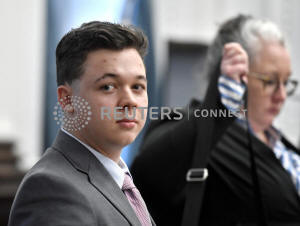Opening arguments set for trial of U.S. teen charged in fatal protest
shootings
 Send a link to a friend
Send a link to a friend
 [November 02, 2021]
By Nathan Layne [November 02, 2021]
By Nathan Layne
KENOSHA, Wis. (Reuters) - The prosecution
and the defense will make opening arguments on Tuesday in the trial of a
U.S. teenager charged with fatally shooting protesters in Wisconsin last
year, launching the most high-profile civilian self-defense case in
nearly a decade.
Kyle Rittenhouse, 18, is charged with reckless and intentional homicides
in the killing of two men and the wounding of a third with an
AR-15-style rifle on a chaotic night of protests on Aug. 25, 2020, in
the city of Kenosha. Rittenhouse has pleaded not guilty and says he
acted in self-defense.
The unrest had been sparked by a white police officer's shooting of a
Black man, Jacob Blake, just three months after the police killing of
George Floyd, another Black man, in Minneapolis sparked nationwide
protests over racism and police brutality.
Rittenhouse has emerged as a hero to some conservatives who believe in
unfettered gun rights and see the shootings as justified during the
chaos that had engulfed Kenosha, while many on the political left have
labeled him a vigilante killer.
The prosecution, led by Kenosha County Assistant District Attorney
Thomas Binger, is expected to argue that Rittenhouse was looking for a
chance to use his weapon and was the aggressor in the deaths of Joseph
Rosenbaum, 36, and Anthony Huber, 26, and in the shooting of Gaige
Grosskreutz, 27, who survived.

They will likely say the three men he shot were trying to disarm him,
according to past court filings in the case.
"In the midst of this crowded scene, the defendant shot and killed
Joseph Rosenbaum and then fled on foot, creating a dangerous active
shooter situation," Binger wrote in a February court filing. "Several
people pursued the defendant and attempted to stop him because they had
no idea what his intentions were or whether he would kill again."
Legal experts have said the prosecution faces a tough
task, however, in convincing a jury that Rittenhouse did not fear for
his life, given video evidence showing all three men were advancing
toward him, with two appearing to reach for his weapon and one armed
with a pistol, when he fired.
[to top of second column]
|

Kyle Rittenhouse looks back at the gallery in the courtroom as the
room is let go for an afternoon break at the Kenosha County
Courthouse in Kenosha, Wisconsin, U.S., November 1, 2021. Sean
Krajacic/Pool via REUTERS/File Photo

Under Wisconsin law, people can only use deadly force if they
"reasonably" believe it necessary to prevent someone from killing or
causing great bodily harm to them.
Deciding what is reasonable will fall to a 20-person jury selected
on Monday after lawyers and the judge vetted candidates for biases,
with many questions focused on their views on the protests and their
experiences with guns.
The trial is poised to be the biggest U.S. court test of a
civilian's right to self-defense since George Zimmerman was
acquitted in 2013 in the fatal shooting of Trayvon Martin, an
unarmed Black teenager.
Rittenhouse's lawyers will likely try to portray the men he shot as
bad actors involved in lawless behavior, giving him reason to fear
for his safety. They may highlight the expected testimony of a
reporter named Richard McGinnis, who told police that Rosenbaum
tried to grab the barrel of Rittenhouse's rifle before the teenager
shot him.
They are also expected to stress audio and video evidence of
protesters yelling things like "Get his ass!" as Rittenhouse
stumbled and fell to the ground before shooting Huber, who swung a
skateboard at him, and Grosskreutz, who was holding a pistol.
(Reporting by Nathan Layne; Editing by Ross Colvin and Peter Cooney)
[© 2021 Thomson Reuters. All rights
reserved.] Copyright 2021 Reuters. All rights reserved. This material may not be published,
broadcast, rewritten or redistributed.
Thompson Reuters is solely responsible for this content.
 |